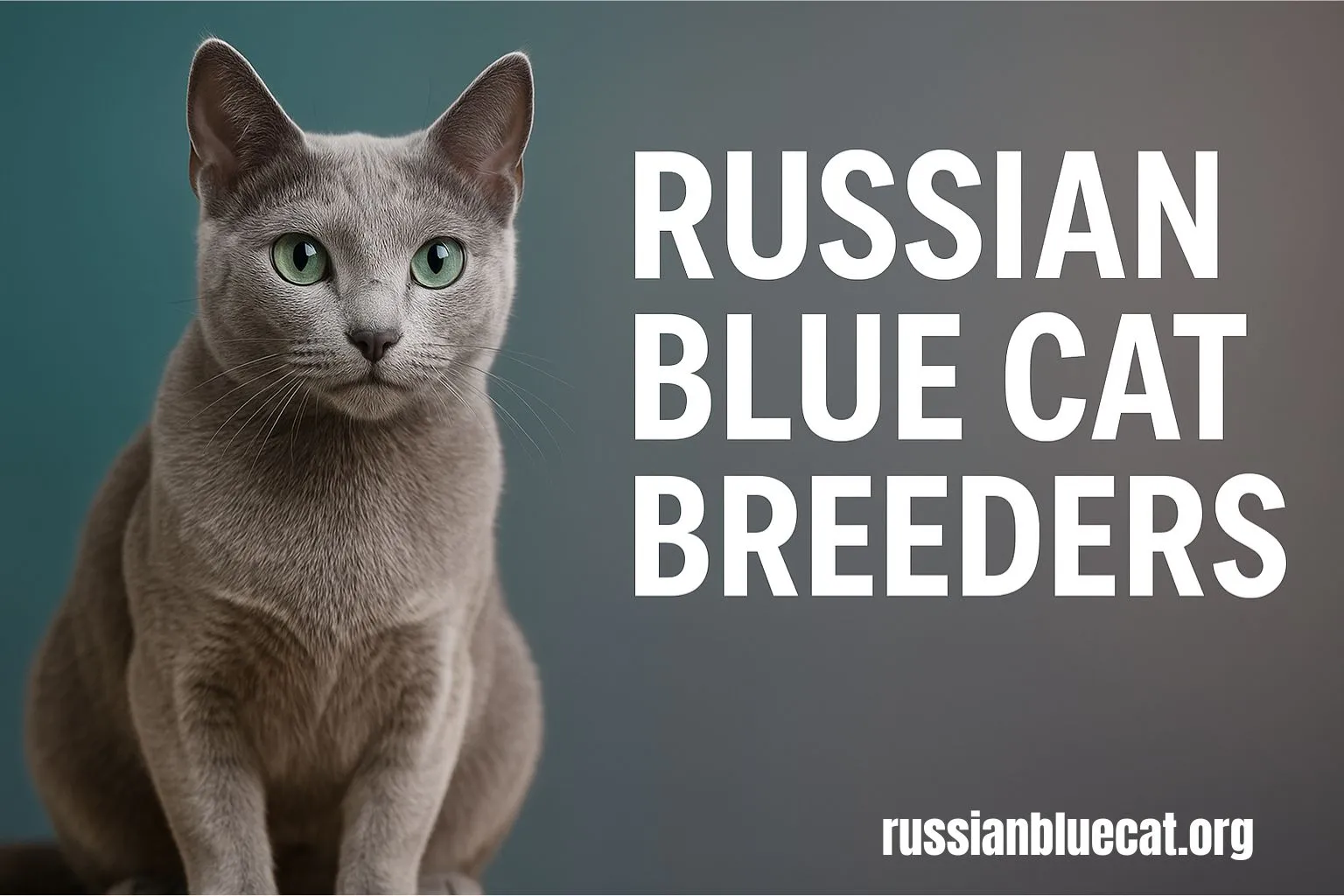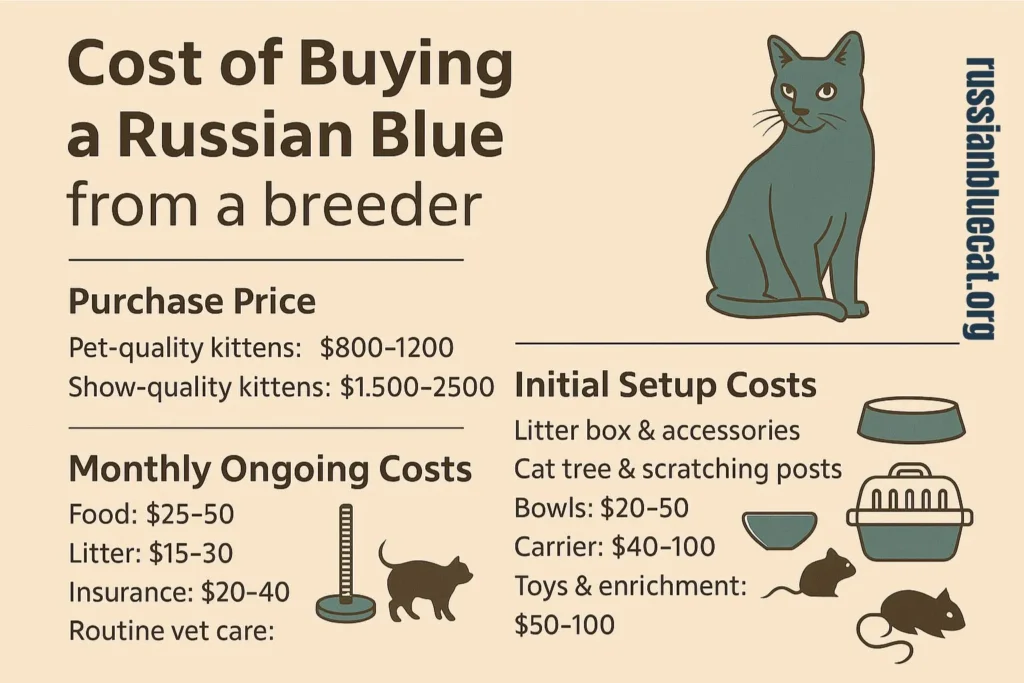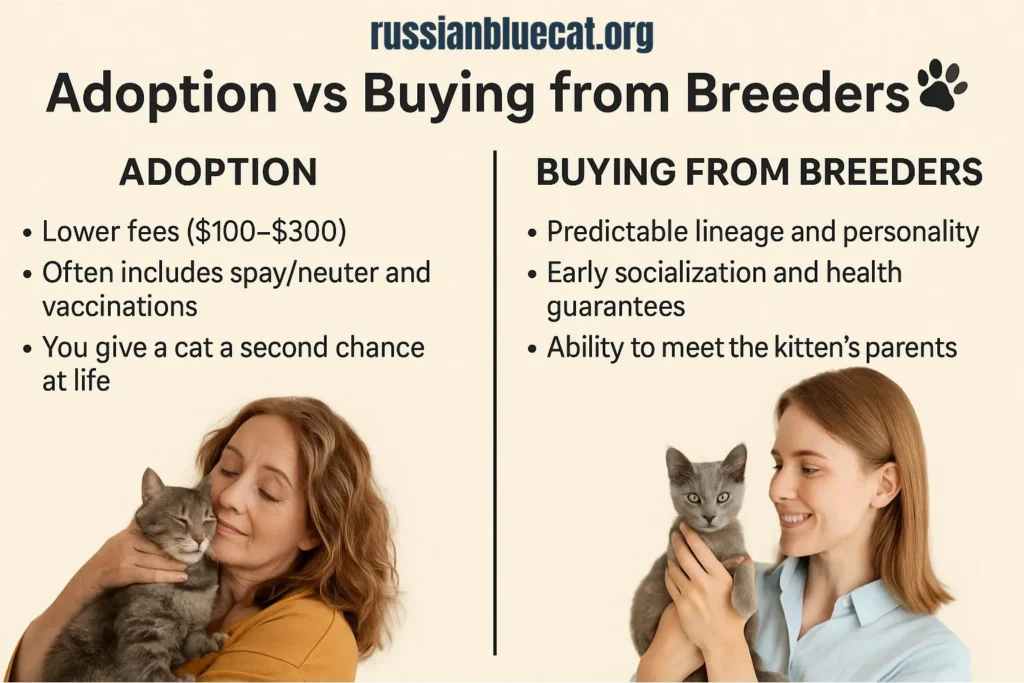From Love to Loyalty: 9 Best Russian Blue Cat Breeders Revealed in 2025

Introduction – Why Selecting the Right Breeder Is Important
Bringing a Russian Blue Cat home isn’t about bringing home a kitten; it’s about committing yourself to a life-long friend that will be part of your family for 15–20 years. With their lustrous silver-blue fur, emerald green eyes, and soft but loving nature, Russian Blues are some of the most captivating cats on the planet.
But the journey starts with an important step: choosing the proper breeder. Your cat’s health, temperament, and even how well they adjust to your home are all affected by the breeder you select. Responsible Russian Blue Cat breeders raise kittens with love, care, and honesty. However, neglectful or irresponsible breeders can give you underlying health problems, behavioral issues, and regret.
This article is your ultimate guide. We’ll cover how to find responsible breeders, what questions to ask, red flags to avoid, the real costs involved, adoption alternatives, and how to prepare your home for your new Russian Blue.
The Role of Russian Blue Cat Breeders
When people hear “breeder,” they often imagine someone simply selling kittens. But real breeders play a much bigger role they act as guardians of the breed.
Why Ethical Breeders Count
- Protection of Health: They test for inherited illnesses such as hypertrophic cardiomyopathy (HCM) and kidney disease, giving kittens the best opportunity for long, healthy lives.
- Temperament Development: Ethical breeders socialize kittens in home settings. It helps Russian Blues, being a naturally timid breed, become well-adjusted and confident.
- Breed Characteristics: They strive to preserve hallmark characteristics: silvery-soft fur, emerald-green eyes, and lean, muscular bodies.
- Support for Owners: Good breeders act as guides. They’ll share advice on food, grooming, and training, often staying in touch long after you’ve taken your kitten home.
In short, breeders who care aren’t just creating pets they’re preserving history and ensuring the Russian Blue’s unique qualities remain intact.
How to Find Ethical Russian Blue Cat Breeders

Searching for breeders can feel overwhelming, especially online where scams are common. Here’s how to start wisely:
1. Check Official Registries
Begin with reliable directories kept by associations such as:
- Cat Fanciers’ Association (CFA)
- The International Cat Association (TICA)
- Fédération Internationale Féline (FIFe)
These associations only include breeders who have fulfilled ethical and health criteria. You can search the CFA Breeder Directory to locate good Russian Blue Cat breeders in your area.
2. Ask for Personal Recommendations
- Become a member of Russian Blue Facebook groups, Reddit forums, or neighborhood cat clubs.
- Ask veterinarians numerous know solid reputation breeders.
- Contact existing Russian Blue breeders; the majority will be glad to relate their experiences.
3. See the Cattery (In Person or Online)
An open breeder will never try to conceal their facility. If you cannot see in person, request a video tour. Check for:
- Clean, scent-free areas
- Playful kittens who are not afraid of humans
- Healthy, relaxed mother cats playing naturally with the kittens
A breeder who does not allow any type of visit is a breeder to avoid.
Questions to Pose to Russian Blue Cat Breeders
Before you sign on the dotted line, have a list of questions ready. The good breeder won’t be insulted rather, they’ll admire your responsibility.
- Can I see the parents of the kitten? This indicates you the temperament and health you can anticipate.
- What medical testing do you do? Good breeders test for congenital and inherited problems.
- Do you provide a written health warranty or agreement? Some offer protection for congenital illnesses.
- How are the kittens socialized? Were they raised as a family pet or individually?
- What are the kittens eating? Gradual changes in diet help minimize stress when bringing them home.
- Do you include vaccination and vet history? This should be included every time.
- What’s your policy if I’m unable to keep the cat? Some ethical breeders require return of kittens instead of abandonment.
These questions not only uncover facts, but also the breeder’s degree of care and dedication.
Red Flags to Look Out For
Sadly, Russian Blues’ popularity means they are a scam target. Here’s what should alert you:
- Too-good-to-be-true prices: $200–$300 “purebred” kittens are nearly always a scam.
- No paperwork or health records: Any reputable breeder will supply documents.
- Large quantity of litters: Moral breeders prioritize quality over quantity.
- Refusal to reveal living conditions: If they don’t want to let you into the environment, they might be concealing bad practices.
- No interest in you: Good breeders are interested in knowing about your way of life to further the kitten’s welfare.
- Pushy for payment: Urgency to pay fast—particularly through insecure means—is an indication of trouble.
If it doesn’t feel right, have faith in your gut and back out.
The Real Cost of Buying from Russian Blue Cat Breeders

Owning a Russian Blue is an investment, both financially and emotionally. Let’s break it down:
Purchase Price
- Pet-quality kittens: $800–$1,200
- Show-quality kittens: $1,500–$2,500
Initial Setup Costs
- Litter box & accessories: $50–$150
- Cat tree & scratching posts: $100–$300
- Bowls (stainless steel/ceramic): $20–$50
- Carrier: $40–$100
- Toys & enrichment: $50–$100
Monthly Ongoing Costs
- Food: $25–$50
- Litter: $15–$30
- Insurance: $20–$40
- Routine vet care: $200–$400 annually
While the costs may seem high, remember—you’re not just buying a kitten, you’re gaining a loyal companion for two decades.
Adoption vs Buying from Breeders

Adoption and buying both have their merits.
Adoption Advantages
- Lower fees ($100–$300)
- Often includes spay/neuter and vaccinations
- You give a cat a second chance at life
Breeder Advantages
- Predictable lineage and personality
- Early socialization and health guarantees
- Ability to meet the kitten’s parents
If you’re flexible, check rescues and shelters first. Russian Blues occasionally appear there, often through breed-specific rescues. But if your dream is a purebred kitten, breeders may be the right choice.
Getting Your House Ready for a Russian Blue
Step 1: Set Up a Safe Room
Select a quiet room with food, water, litter, and a comfortable bed. This allows your kitten to ease into new surroundings.
Step 2: Get the Essentials
- Premium dry and wet food
- Stainless steel or ceramic food and water bowls
- Odor-free litter and litter box
- Scratching posts and cat trees
- Interactive toys for attachment
Step 3: Transition Gradually
Add new rooms gradually. Don’t overwhelm your kitten with lots of noise or too many visitors in the initial week. Russian Blues require patience.
Life with a Russian Blue from Breeders
Personality
Russian Blues are loving but independent. They tend to form strong bonds with one or two individuals, accompanying them from room to room.
Compatibility
They’re wonderful with polite children and will learn to live with other animals if introductions are made gradually.
Daily Needs
- Regular feeding times
- Daily playtime to ensure they remain active
- Quiet places for their long naps
Having a Russian Blue around is like having a graceful, observant companion who appreciates your company as well as their freedom.
FAQs Regarding Russian Blue Cat Breeders
Conclusion – Your Future with a Russian Blue
Finding the perfect breeder isn’t merely where your kitten is from it’s about creating the future for your cat’s life. Responsible Russian Blue Cat breeders are concerned about every aspect, from genetics to disposition, so that your new friend is well-adjusted, healthy, and happy.
Whether you adopt or purchase, keep in mind that a Russian Blue is a life-long pet. They’ll be with you through life’s ups and downs—watching quietly, purring softly, always faithful. The affection and friendship they offer in return is well worth every step you take in selecting the proper start.






